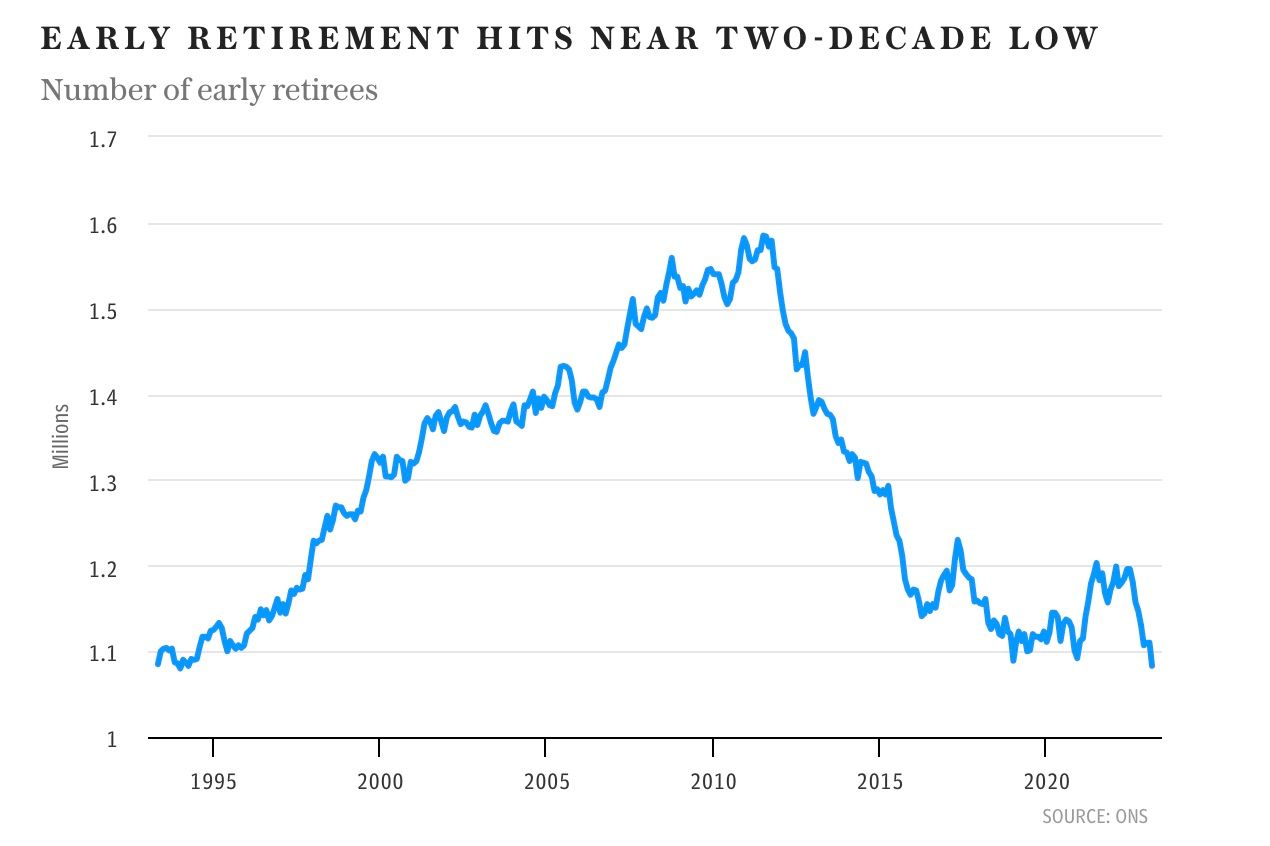Unretirement: Is This the Ultimate Power Move?

Summary: Retirement is evolving. Discover why unretirement is the ultimate power move for flexibility, purpose, and freedom.
The Rise of Unretirement
Unretirement is no longer a buzzword—it’s a growing movement reshaping midlife and retirement as we know it. According to a recent report by the UK's Office for National Statistics (ONS), rising living costs have prompted nearly 100,000 early retirees (under 64) to return to the workforce between March 2022 and March 2023.
In just the first quarter of 2023, roughly 38,000 people returned to work, a marked increase from 15,000 the previous year.
Here's what's noteworthy. That’s the lowest number of early retirees in almost 30 years.

And it’s not just the UK. This “Great Unretirement” aligns with a global trend brought about by a combination of economic pressures, demographic shifts, and improved health outcomes.
For example, the number of people working in the 65 and older age group in the United States has been increasing. Moreover, the Bureau of Labour Statistics predicts this growth will continue until 2024, suggesting that retirees will continue to return to work or put off retirement due to insufficient savings.
Countries like Germany and Italy are also witnessing extended working lives thanks to better health care, pension adjustments, and cultural shifts.
Why Are Retirees Returning to Work?
Here’s why more retirees are choosing to return to work:
- Financial Necessity Meets Opportunity: Rising costs, inflation, and inadequate retirement savings are pushing many retirees to return to work for financial stability.
- Better Health, Longer Lives: Improved health and longevity mean retirees are mentally and physically capable of staying productive well into their later years. This vitality is enabling many to reinvent their careers after 50.
- A Pursuit of Meaning and Passion: For some, it’s not just about money. Returning to work offers a chance to engage in meaningful projects, explore new interests, or strike a fulfilling balance between work and leisure.
- Finding Structure and Connection: Retirement often leaves a void in structure, social interaction, and identity. Many midlife adults find these elements in part-time jobs, consulting gigs, or volunteer roles.
Unretirement is Redefining the Very Notion of Midlife
The traditional concept of retirement originated in the early 20th century when shorter life expectancies and defined pension plans supported a few golden years of rest. But today, with life expectancy climbing into the 80s and beyond, spending decades without structure or purpose is no longer appealing—or, in many cases, financially viable.
A study by the World Economic Forum reported that many people are increasingly concerned about their financial security as they live longer lives. At the same time, a global skills shortage has companies eager to tap into experienced talent, making unretirement not just a personal choice but also an economic advantage.
But for the cynical among us, unretirement doesn’t just mean "going back to work." Instead, it's an invitation to create a hybrid, purposeful life that blends flexibility with meaning.
For some, this could mean part-time roles or consulting; for others, it’s entrepreneurship, volunteering, or creative ventures. It’s a chance to build a "portfolio life" that aligns with personal aspirations and goals.
Meet Angela, The Reluctant Retiree Turned Consultant
Take Angela, for instance. She retired at 62, expecting to enjoy leisurely days, but soon found herself restless. “I spent decades building deep expertise in supply chain management, and all that knowledge just felt like it was going to waste,” Angela recalled.
Through a serendipitous conversation at a networking event, she decided to explore consulting. Starting small, she took on part-time gigs advising local businesses.
It wasn’t long before her consultancy expanded into a flexible career that kept her engaged while honoring her newly balanced lifestyle. “I’ve never been happier. I call my own shots now, and I’m still making an impact,” Angela shared.
Angela’s story encapsulates the principles of unretirement—flexibility, fulfillment, and the freedom to choose how you work.
Debunking Myths About Unretirement
- Myth 1 - Older workers return only out of financial necessity: The truth is that while financial security is a factor, purpose, social engagement, and personal growth are often more potent motivators for unretirement.
- Myth 2 - Older employees can't keep up with changing industries: The truth is that, with access to retraining opportunities and a wealth of on-the-job experience, returning workers provide valuable stability and insight to companies.
What Decision Makers Need to Know
Unretirement is about more than personal choice; it’s a seismic shift in how the workforce is evolving. Decision makers in large organizations should be paying attention to this trend—and capitalizing on it to benefit their businesses.
Why Hiring Midlife Professionals is Smart Business
- Experience: Older employees bring decades of deeply valuable experience that benefits mentoring, leadership, and problem-solving.
- Reliability: Studies consistently show that older workers are more reliable and have lower absenteeism rates compared to their younger counterparts.
- Innovation & Diversity: A multigenerational workforce fosters innovation, with a mix of perspectives leading to better solutions and collaboration.
Organizations that want to remain competitive should focus on removing age-related barriers to entry, investing in skills development for older workers, and building age-inclusive workplace cultures.
Practical Steps Toward Unretirement
Thinking about unretirement? Here’s how to make it work for you.
Clarify Your Goals
- What do you miss about working?
- How much time are you willing to dedicate?
- Are there new passions or skills you’d like to explore?
Consider Flexible Work Options
- Look into part-time roles, consulting, freelance jobs, or volunteering for causes you're passionate about.
Invest in Lifelong Learning
- Stay relevant in the job market with online courses and certifications. Learn new industry trends to future-proof your career.
Leverage Your Network
- Many career restarts come from networking opportunities—don’t hesitate to reconnect with former colleagues and contacts.
Think Long-Term
- Create a plan that balances financial security with job flexibility and personal fulfillment.
The Interlude Café's Take
The "Great Unretirement" not only shows a significant shift in the way people are working, but it also stresses the need for a different take on financial planning as life becomes increasingly nonlinear.
There's also a pressing need for urgent policy changes to make jobs for older people more flexible and acceptable. This will be an ongoing challenge as age discrimination continues to remain a significant challenge in the workplace.
It could be argued that the unretirement wave is just a temporary blip and that things will return to normal once the cost of living crisis has subsided.
But our instinct tells us otherwise. I suspect that with increasing longevity and rising living and health standards, we can expect to see a different trend altogether.
Rather than "putting off" retirement, my money is on more people "mixing it all up" by taking "micro-retirements" throughout life but extending their working life. I'm one of those people.
Of course, that brings a number of other challenges, such as implementing a wide range of policy solutions to ensure the workplace is an age-less workplace. And right now, we're a long way from that.
Unretirement
Author's note: Remember that this summary provides an overview of significant themes mentioned in the study, with our insights thrown in for good measure. For the full context and depth of content, always refer back to the original studies and articles.
Got an idea? We want to hear from you!
At The IC, we're always excited to bring fresh perspectives and unique voices to our community.
We'd love to connect if you have feedback, an article idea, or want to join us as a guest writer.
Email us at hello@interludecafe.com or head over to our Contact Us page to get started!






